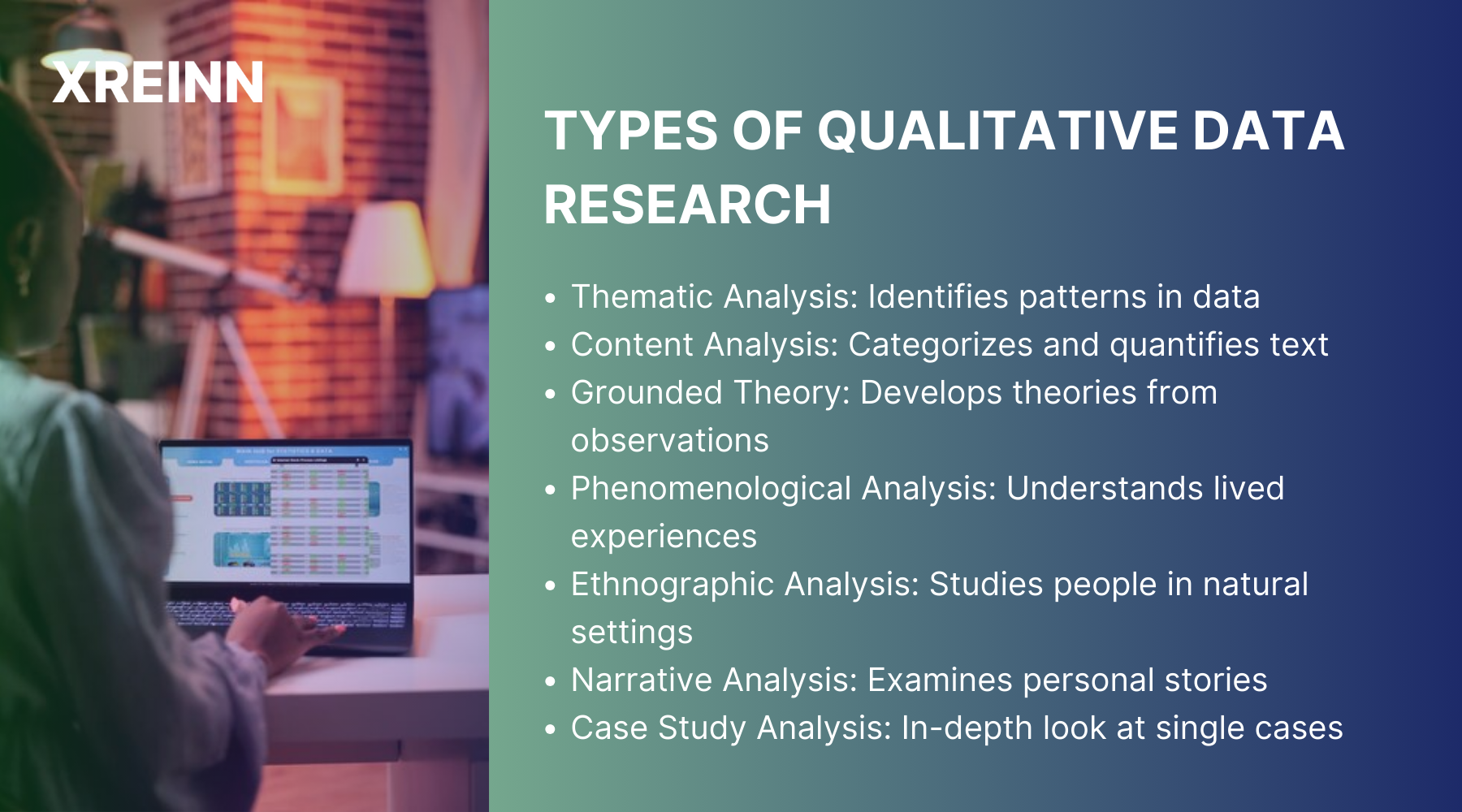Data Analytics
7 Types of Qualitative Data Research and Analysis With Examples
Jul 02, 2024
Qualitative research is a type of research that is performed to understand human experiences and behaviors. Unlike quantitative research, which uses numerical data and statistical analyses, qualitative research is used to find out the richness and complexity of human perspective and behavior. There are various types of Qualitative data analysis.
In this article, you will understand seven widely used qualitative data analysis methods, including thematic analysis, content analysis, grounded theory, phenomenological analysis, ethnographic analysis, narrative analysis, and case study analysis.
Types of Qualitative Data Research

1. Thematic Analysis
Thematic analysis is one of the most common qualitative data analysis methods. It involves identifying, analyzing, and reporting patterns (themes) within data. The process begins with familiarizing the data, followed by coding, where data is broken down into manageable chunks and assigned labels. These codes are then examined for patterns, which are developed into themes.
For example, in a study exploring the experiences of cancer patients, thematic analysis might reveal themes such as "emotional support," "fear of recurrence," and "coping strategies." These themes provide a structured framework to interpret the data and draw meaningful conclusions about the patient's experiences.
2. Content Analysis
Content analysis is a systematic method for analyzing textual information. It involves categorizing verbal or behavioral data to classify, summarize, and tabulate the data. Unlike thematic analysis, content analysis often quantifies the presence of certain words, themes, or concepts within the data.
For instance, in a study analyzing media coverage of climate change, content analysis might quantify how often certain terms (e.g., "global warming," "sustainability") appear in articles, revealing trends and biases in media reporting. This method can be used to draw inferences about the societal impact of the content being analyzed.
3. Grounded Theory
Grounded theory is an inductive method that is used to develop theories grounded in real-world observations. Rather than starting with a hypothesis, researchers collect and analyze data, allowing themes and theories to emerge from the data itself.
In a grounded theory study on workplace dynamics, researchers might conduct interviews with employees to uncover underlying patterns of behavior and interaction. Through iterative data collection and analysis, they might develop a theory about how organizational culture influences employee motivation and job satisfaction. This method is particularly useful for exploring new or complex phenomena where pre-existing theories may not apply.
4. Phenomenological Analysis
Phenomenological analysis focuses on understanding the lived experiences of individuals. Drive from the philosophy of phenomenology, this method seeks to describe and interpret the essence of these experiences without preconceived notions.
For example, a phenomenological study on the experience of living with chronic pain might involve in-depth interviews with participants to capture their narratives. The researcher then analyzes these narratives to identify the essence of the experience, such as the sense of isolation or the struggle for normalcy. This approach provides deep insights into how individuals perceive and make sense of their experiences.
5. Ethnographic Analysis
Ethnographic analysis is closely associated with cultural anthropology and involves studying people in their natural environments. Interestingly researchers immerse themselves in the community or group they are studying, often participating in daily activities to gain a deep understanding of cultural practices and social interactions.
In an ethnographic study of a rural farming community, the researcher might live within the community, observing and participating in farming activities, social gatherings, and daily routines. Through this immersive approach, the researcher can analyze how cultural norms and values shape the community's way of life, providing a rich, contextualized understanding of the social dynamics at play.
6. Narrative Analysis
Narrative analysis involves examining the stories people tell to make sense of their experiences. This method focuses on the structure, content, and function of these narratives, exploring how they are constructed and what they reveal about the individual's identity and worldview.
For instance, in a narrative analysis of veterans' experiences of returning to civilian life, researchers might analyze personal stories shared during interviews. They would look at how veterans construct their narratives, the themes and motifs they use, and how these stories help them cope with their transition. Narrative analysis can uncover the deeper meanings and significance of personal stories, offering insights into how individuals interpret and communicate their experiences.
7. Case Study Analysis
Case study analysis involves an in-depth examination of a single case or a small number of cases within their real-life context. This method is particularly useful for exploring complex phenomena that cannot be easily separated from their context.
For example, a case study analysis of a successful startup company might involve a detailed examination of the company's history, organizational structure, management practices, and market strategies. Through this comprehensive analysis, researchers can identify key factors that contributed to the company's success and draw lessons that may apply to other similar contexts.
Conclusion
Qualitative data analysis methods are diverse and versatile, each offering unique insights into the human experience. Thematic analysis provides a structured approach to identifying patterns within data, while content analysis allows for the systematic quantification of textual information.
Grounded theory enables the development of new theories based on real-world observations, while phenomenological analysis captures the essence of lived experiences. Ethnographic analysis offers deep cultural insights through immersive observation, and narrative analysis explores the structure and function of personal stories. Case study analysis provides a detailed examination of specific cases within their context.
By choosing the appropriate qualitative data analysis method, researchers find insights into the complexities of human behavior, social interactions, and cultural phenomena. Each method has its strengths and can be used in combination to provide a comprehensive understanding of the research topic. As qualitative research continues to evolve, these methods will remain essential tools for exploring the diverse and intricate nature of human experiences.

Data Analytics
Jun 27, 2024Master key concepts in data analytics with practical tips to enhance decision-making and achieve success in your projects and professional growth

Data Analytics
Jul 01, 2024Learn the essential stages of the data analytics workflow to turn your data into valuable business insights and drive growth.

